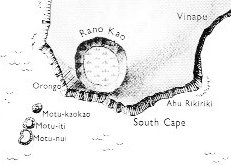7. The kuhane then left the 3 islets and went ashore on the mainland below Rano Kao:
The dream soul of Hau Maka continued her journey and went ashore on the (actual Easter) Island. The dream soul saw the fish Mahore, who was in a (water) hole to spawn (?), and she named the place 'Pu Mahore A Hau Maka O Hiva'. The dream soul of Hau Maka evidently had an important business in naming the places which she encountered when flying over the island. A dream soul is similar to a bird, and possibly the manu rere glyph type (or some variant of it) was used in the rongorongo texts in order to denote a kuhane. Maybe the variant of manu rere with a beak like the prow of a canoe (rather than the normal beak formed like a toki) represents Moon and thus indirectly also a kuhane:
In the name given, Pu Mahore A Hau Maka O Hiva, the standard expression A Hau Maka O Hiva can be translated a 'belongs to Hau Maka in Hiva'.
|

